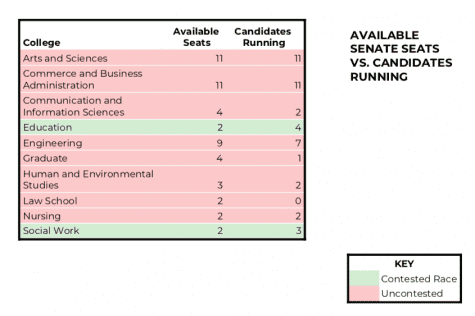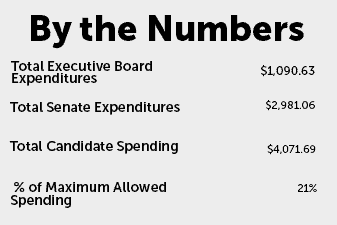No Contest: SGA candidates run vastly unopposed
February 24, 2020
It’s usually easy to tell when it’s a campaign week. Backpacks and tote bags are adorned with plastic buttons, profile pictures are
updated with logos and banners, and students line the Quad to pass out flyers for their candidates of choice.

But this week, students might see a shortage of buttons, koozies and laptop stickers. That’s because this year, the entire SGA Executive Board, as well as senators from several colleges, are running unopposed.
The CW reported on Thursday that, for the first time since 2013, the presidential spot was going uncontested. Two days before the Elections Board published an official candidate list, the CW obtained an email that confirmed Demarcus Joiner would be the only candidate running for SGA president.
Joiner is no stranger to lackluster competition. Last year he was among six executive candidates to run unopposed. The only spots that went contested were for president and the Vice President of Financial Affairs.
As for the Senate, candidates must fill a total of 50 seats across 10 colleges for the 2020-2021 academic year. This year, a special election will have to be held for several seats, since several colleges are facing uncontested, and even under-contested, races.
Currently, the only colleges with more candidates running than seats open are the Colleges of Education and Social Work, leaving 10 seats uncontested across other colleges. The law school, which allots two spots, has no candidates running.
FUNDING
The Crimson White compiled a list of all Senate and Executive Board candidates and compared their budgets, which are published on the SGA website. In both races, we noticed two key patterns: greek influence and underspending.
While SOURCE-registered organizations have the right to contribute to individual campaigns, the only non-individual or family donations were made by fraternities and sororities.

Of Executive Board candidates, Sam Rickert, a sophomore majoring in political science is supported by an $800 contribution from Phi Delta Theta. Phi Delta Theta also supported freshman Chip Porter, a Senate candidate for the College of Arts and Sciences, making him one of eight potential senators to be funded by a Greek organization.
Other contributing Greek organizations include Alpha Delta Pi, Pi Kappa Alpha, Phi Mu Alpha, Delta Tau Delta, Alpha Tau Omega, Pi Beta Phi and Zeta Tau Alpha.
According to the Elections Board manual, maximum spending is $1000 for President, $800 for all other Executive Board candidates and $300 for Senate candidates. According to budgets publicized by the Elections Board, the only candidate to actually spend the maximum amount was freshman Audrey Cummins, a Senate candidate for the College of Arts and Sciences.
In total, candidates only spent about 20% of what they were allowed to, while several received individual and Greek contributions but did not list any expenses.
FOLLOW THE MONEY
Here’s how much SGA candidates spent on campaigns this year, and who’s funding them.
Editor’s Note: A previous version of this article incorrectly stated that the College of Commerce and Business Administration had 13 candidates running for Senate. The story and one accompanying graphic have been corrected to reflect an uncontested race within the college.








